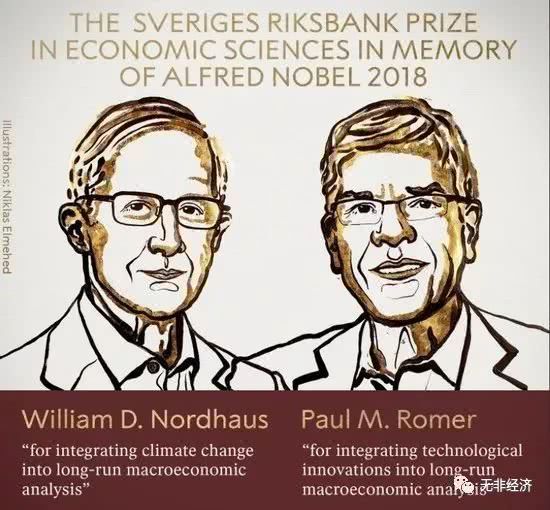Do you know the winner of the 2018 Nobel Prize in Economics?

DaDa / tr. by Phil Newell)
Winner of the 2018 Nobel Prize in Economics
At around 17:50 Beijing time, the Royal Swedish Academy of Sciences announced that it would award the 2018 Nobel Prize in Economics to William D. Nordhaus and Paul M. Romer, two American economists for combining technological innovation and climate change with economic growth.
Nobel laureate in economics criticizes Trump for criticism
Two American economists who won the 2018 Nobel Prize in economics held separate press conferences on the 8th to criticize the policies of the Trump administration. This shows the strained relationship between frontline American economists and the Trump administration.
William William Nordhaus, who is well known as an advocate of a "carbon tax", criticised the Trent government, which is sceptical about climate change, as "stupid" and said it was "necessary to stick to it in difficult times".
Another winner, Paul Romer, who established a new theory on the impact of technological innovation on economic growth, pointed out that "what must be borne in mind is that globalisation is not simply the exchange of goods, but the sharing of ideas". Expressed concern about the isolationist tendencies of the Trump administration.
Get to know Nordhaus together
Nordhaus is a professor at Yale University, whose main research area is the economics of climate change, showing how humans ignore the disastrous high costs of inaction. DICE (Dynamic Integrated Climate- Economy) proposed by Nordhaus (1994) is an optimization model, which is used to calculate the costs and benefits of emission reduction measures and to determine the optimal emission reduction.
William D.Nordhaus studies a wide range of economics, including the environment, prices, energy, technological change, economic growth, profits and productivity growth trends. Its main research fields: growth economics, wages and prices, ecological management economics, transition economics. In addition, he is one of the 50 most influential economists in the United States and one of the top global analysts on the economics of climate change.
In 1972, William D.Nordhaus and Tobin, who also won the Nobel Prize in economics, proposed the net Economic Welfare Index (Net Economic Welfare). They argue that the social costs arising from urban pollution and other economic activities should be deducted from GDP; at the same time, domestic activities, social obligations and other economic activities that have been neglected. Nordhaus believes that the most effective way to solve Greenhouse Effect is to impose a carbon tax on all countries around the world.
Get to know Paul Romer together
The Nobel jury explained: if DICE is applied in practice, the first scenario is that the government does not act and does not change the existing policy, and we can see the relationship between the evolution of carbon dioxide emissions and global industrial emissions; second, the government has more policy tendencies, and then look at the impact on global carbon dioxide emissions. At this point, you can make a comparison between the advantages and disadvantages.
Paul Romer is an American economist and professor at Stanford University. He is considered an expert on economic growth and a strong candidate for the Nobel Prize in economics. Romer received a bachelor's degree in physics from the University of Chicago in 1977 and a doctorate in economics from the university in 1983. He was selected by time magazine as one of the 25 most influential people in the United States in 1997.
Paul M. Romer)
One of the problems we face today is that people always feel that protecting the environment is so expensive and difficult, so they just want to ignore the problem and pretend it doesn't exist, Romer said. Human beings have the ability to make amazing achievements, as long as we are willing to do so. And it will not be at the expense of economic growth in the long run. Once we start trying to reduce carbon emissions, we will be amazed that it is not as difficult as we thought.
The Nobel committee said: the main message this time is global cooperation to deal with climate change. This requires a global solution, and every country needs to be aware of the importance of dealing with this problem.
Is William Nordhaus's climate change research in the same basket as Paul Romer's healthy, sustainable economic growth? In this regard, the jury of the Royal Swedish Academy of Sciences believes that the internal connection in the research field of the two macroeconomists is far beyond the surface. Per Krusell says the two scholars are actually thinking about the same agenda: dealing with long-term and international problems.
They all share the same views on economic policy and market failure, although their studies do not seem to be the same on the surface.
- Prev

The care of succulent plants for 12 months is all here.
The network looks at the healthy growth of the beloved succulent plant, and there will be a full sense of achievement in the heart. However, with the change of climate and environment, the content of horticulture must be adjusted accordingly! Beginners may feel at a loss in this respect.
- Next

Clank the iron bones only for the Iraqi.
Text: network coordinates: Fujian Shishi environment: eastern balcony plus make-up lights to see this title, uncle remembered some time ago, saw a foreign website touted to sell (men's) succulent, mainly some Euphorbiaceae, cactus.
Related
- Wuhan Hospital Iron Tree Blooming Result Was Instantly Frightened by the Gardener Master
- Which variety of camellia is the most fragrant and best? Which one do you like best?
- What is the small blue coat, the breeding methods and matters needing attention of the succulent plant
- Dormancy time and maintenance management of succulent plants during dormancy
- Minas succulent how to raise, Minas succulent plant pictures
- What are the varieties of winter succulent plants
- How to raise succulent plants in twelve rolls? let's take a look at some experience of breeding twelve rolls.
- Attention should be paid to water control for succulent plants during dormant period (winter and summer)
- Watering experience of twelve rolls of succulent plants
- Techniques for fertilizing succulent plants. An article will let you know how to fertilize succulent plants.

